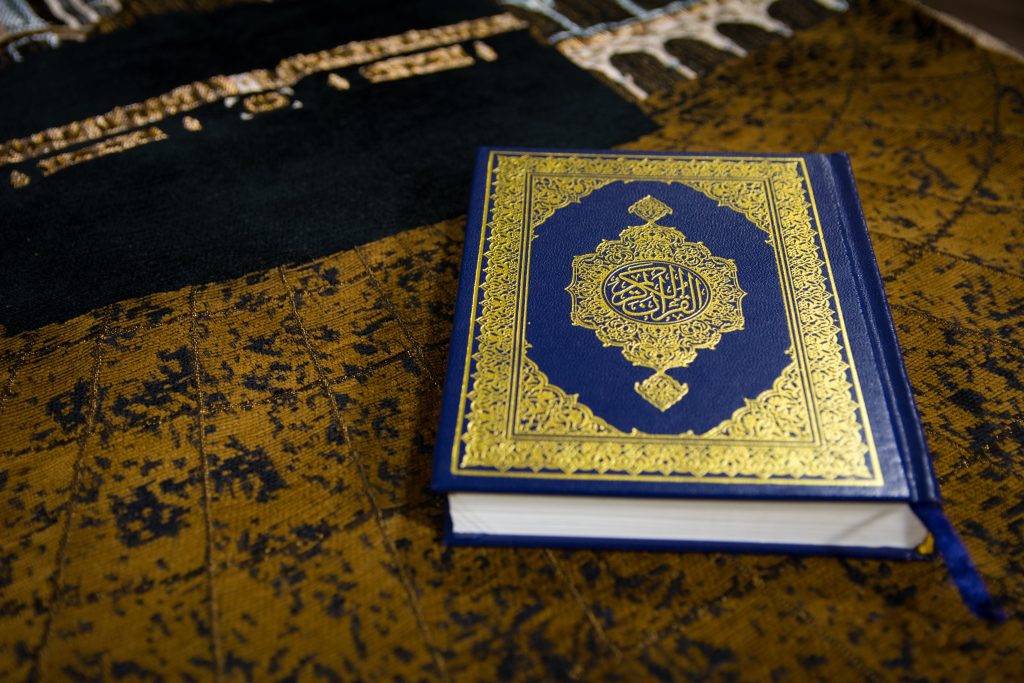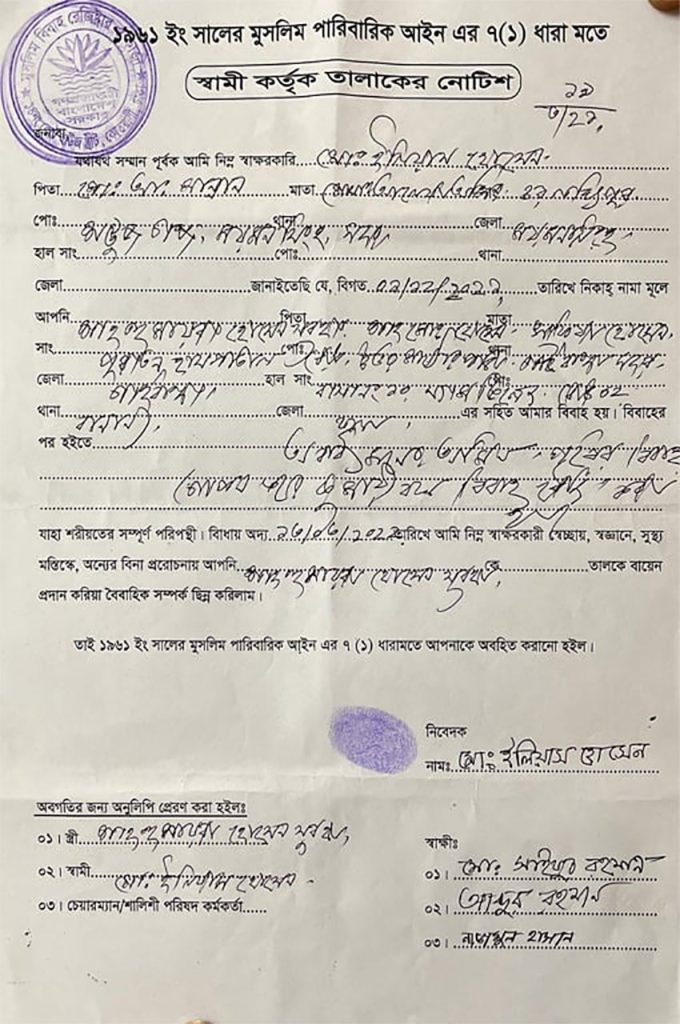
what is Divorce:
Divorce means the formal ending of marital life between the husband and wife. Through divorce both the husband and wife lost their conjugal rights along with other marital rights upon one another. Though divorce is allowed in few of the religions in the world, but now a days it is happened in people of all religions. Though divorce is not expected but in certain situations it is required.
What is Divorce Paper:
Divorce paper means the legal or formal document of divorce. When a divorce is held, there needs to perform some formalities (like – giving notice by one party to another, meeting for compromise by the parties along with their guardians, divorce registration). After performing all the formalities when a divorce is done , there needs to register the divorce. The registration paper of a divorce is called divorce paper.

What Divorce Letter:
The notice served under the Section 7 of the the Muslim Family Laws Ordinance, 1961 for the perpose of giving divorce is called divorce letter.
Divorce rate in Bangladesh
In Bangladesh the rate of divorce is increasing alarmingly day by day. In last year the divorce rate in Bangladesh was 1.4 per thousand. The rate of divorces is the highest in Dhaka. Averagely, in every 40 minutes a divorce was registered in Dhaka. The rate is increasing outside Dhaka as well. Once upon a time time women of our country never thinks about divorce. The sceneray has changed. Now women are applying more for divorce.
Divorce Law in Bangladesh
From religion to religion, divorce laws differ. As distinct divorce procedures and laws apply in Bangladesh for Muslims, Hindus, Christians and Buddhists each faith has its own unique perspectives on divorce or the separation of marriage. For instance – Hinduism and Christianity do not approve divorce as their belief marriage is a holy relationship. On the other hand Islam recognizes the right of divorce for both husband and wife. Along with personal laws the following laws are applicable for divorces in Bangladesh:
Divorce Act, 1869
The Family Courts Ordinance- 1985
Muslim Family Law Ordinance, 1961.Dissolution of Muslim Marriage Act, 1939
The Muslim Marriages and Divorces (Registration) Act, 1974
Special Marriage Act, 1872
The Hindu Married Women’s Right to Separate Residence and Maintenance Act, 1946
Hindu Marriage Registration 2012
Hindu Marriage Registration Rules, 2013
Divorce under Muslim Shariah Law

Islamic Shariah law provides the following types of divorces for muslims –
a.Husbands Power: Talaq
b.Wife’s Power: Talaq-i-Tafweez
c.Mutual Consent
d.Other Processes
(a) Husbands power: Talaq
The husband is in better position than wife in Islam regarding talaq as shariah firmly grants him (husband) the exclusive right to divorce. No clause in the agreement is necessary for the husband to use his unilateral right to pronounce talaq. He can do so without providing any justification at all. When the husband pronounces talaq, the wife has to perform iddat period for 3 months or 3 menstrual cycles. If the woman does not become pregnant during those three months, the talaq will be deemed successful at the end of the iddat period. There are three forms of talaq in Islam given by the husband…
I.Talaq-i-Ahsan
If a single revocable talaq is pronounced by the husband and he will refrain from sexual activities with his wife for three lunar period without revoking it, the talaq i hasan will take effect after the expiry of such period.
II.Talaq-i-hasan
In talaq i hasan, there needs 3 single revocable pronouncements by the husband in three consecutive lunar months. Whether the first two announcements have been revoked or not, the talaq-i-hasan is done when the 3rd revocable pronouncements were uttered by the husband. During these period unconsummated purity is required. The third pronouncement, known as talaq-i-Hasan, is final and cannot be revoked.
III.Talaq al Bida or Triple Talaq
When a husband pronouces talaq three times at the same gathering or uttered a single irrevocable talaq, the talaq becomes effective and irrevocable. This is known as talaq al Bida or Triple Talaq. Both of these declarations are definitive and irrevocable the moment they are made.
(b) Wife’s Power: Talaq-i-Tafweez
According to Islam a wife is not entitled to end a marriage on her own. She can only end a marriage on her own if the husband gave her the authority giving divorce at the time of marriage. This is called delegated talaq or talaq-i-tafweez. The power of giving divorce by the wife entirely depends on their marriage contract. Only then the wife be able to dissolve the marriage by using that authority without turning to the husband or a judge if there were any clauses governing delegation of such power by husband and wife placed in the marriage contract. Column 18 of the kabinnama in Bangladesh deals with a husband’s delegation of the right to talaq.
(C)Mutual consent (khula, Mubarat)
By mutual consent there are two ways for dissolution of marriage named khula and mubarat. When both the husband and wife agree to dissolve their marriage mutually it is called mubarat. On the other hand, when a husband gives divorce on request of his wife it is known as a khula or redemption.
(d) Other processes
Other process of dissolution of marriage under Muslim law are as follows:
Ila
If the husband swears in the name of Allah that he will refrain from having any physical relation with his wife for the period of 4 months, the court will dissolve that marriage after the expiry of mentioned period. This type of divorce is known as ila.
Zihar
Zihar refers to comparison. Zihar will occur if the husband compares his wife with his mother. Zihar prohibits a husband from cohabiting with his wife before atonement. Though zihr itself does not dissolve the marriage, the wife has the right to file a suit for judicial divorce if no atonement is made.
Lian
If the husband brings an allegation of adultery against his wife by taking oath in the name of Allah and the wife deines such allegation also by taking oath in the name of Allah – it is called lian. In such situations the court can set aside the marriage because of conflicting oath.
Divorce Procedure in Bangladesh:

Divorce Procedure For Muslim Husband in Bangladesh
Section 7 of the the Muslim Family Laws Ordinance, 1961 provides the procedure how a muslim husband may give divorce his wife in the following manner: The
First Step:
The first Step for giving talaq by husband is pronouncing talaq. A husband who wishes to divorce may verbally pronounce Talaq to his wife.
Second Step:
After the pronouncement of talaq, a written notice must be served upon the chairman of union Parishad. A copy of this notice also to be served upon the wife.
Third Step:
Within 30 days of receiving such notice, the chairman will constitute an arbitration council and attempt to make a settlement between the parties. If necessary the chairman may take any other required actions for reconcilliation.
Fourth Step:
If the reconciliation process fails, the divorce will be finalized. After that, the wife has to perform three months iddat period. If the Wife is pregnant at the time of talaq, the divorce will be effective after the expiration of pregnancy.
Fifth Step:
Once the divorce has been completed, then it shall be registered. Without registration of divorce 2nd marriage or next marriage registration is not possible.
Divorce Procedure For Muslim Wife in Bangladesh
As per section 8 of the Muslim Family Laws Ordinance, 1961, a muslim wife may exercise the right of divorce in the same manner as like as a muslim husband (provided in section 7) mentioned in the above, if she gets the right to divorce by delegation from husband. Moreover, under Section 2 of the Dissolution of Muslim Marriages Act, 1939 a muslim wife shall be entitled to obtain a decree for dissolution of marriage in the following grounds:
- I. If the husband has been missing or not found for four years
- II. If for 2 years the husband has failed to provide his wife maintenance.
- iii. If the husband has been sentenced to or imprisoned for 7 years or more
- IV. If the husband has failed to perform a marital obligation for 3 years or more
- V. If the husband was impotent or continue to be so.
- VI. If the husband has failed to fulfill marital responsibility for 3 years or more
- vii. If the for period of 2 years the husband has been insane and suffering from any other critical diseases
- viii. If the wife was been married off before the age of 18 years and she repudiates the marriage before attaining 19 years of age.
- IX. If the wife is being treated with cruelty by her husband.
Registration of Muslim Divorces
After the execution of divorce, it shall be registered. On application of the party, a registrar shall register a muslim divorce (whether it is given by husband or wife) under section 6 of the Muslim Marriages and Divorces (Registration) Act, 1974.
Hindu Divorce Procedures in Bangladesh
In Hindu personal law there is no scope of divorce. Because, Hindu marriage is considered as a divine bond and sacrament which cannot be broken by divorce. In Bangladesh, though there exists no separate law on Hindu Marriage and Divorce, but there is a a scope of judicial separation. Under section 6 the Family Courts Ordinance- 1985 a Hindu married couple can file a petition before the Family Court to obtain the decree of dissolution of marriage. The procedures for obtaining a decree of dissolution of hindu marriage are as like as the procedure of family suit which is started with the filing with plaint and ended with the decree given by the family court.According to the Hindu Marriage Registration Act, 2012 and Hindu Marriage Registration Rules, 2013 dissolution of Hindu Marriage registration is not mandatory.
Divorce Procedure for Christians in Bangladesh
Christian personal law establishes that marriage is an eternal and lifelong union, for which there is no possibility of divorce or dissolution. Nonetheless, Christian divorce is permitted limitedly in Bangladesh under the Divorce Act of 1869 by the court.As per provisions of the Divorce Act 1869, a petition for christan divorce has to be filed in the the District Judge’s Court or the High Court on the reasons of adultery, cruelty, impotency etc.
Divorce Procedure for Buddhists in Bangladesh
According to the Buddhist perspective, marriage is not a sacrament but rather a secular institution. Unlike Hinduism, Buddhism does not have any prohibitions on divorce. Buddhists hold that it is preferable to get a divorce or dissolve a marriage if it is causing suffering. Since there is no Buddhist personal law in Bangladesh, Buddhists residing there do not adhere to any specific divorce laws. Their divorces follow the hindu divorce procedure in Bangladesh.
Documents required for divorce:
The following documents are required for giving divorce-
a) One photocopy kabinnama.
b) Photocopies of National Identification Number of both husband and wife.
c) Photocopies of National Identification Number of two male witnesses.
d) 1 copy photo if any affidavit is prepared by a lawyer.
Best Divorce Specialist Lawyer in Bangladesh
Law for Nations has the best team of divorce lawyers across Bangladesh. People from any corner of the country contact Law for Nations to legally complete divorce procedures and avoid future legal complications.
Sample of Divorce Letter

